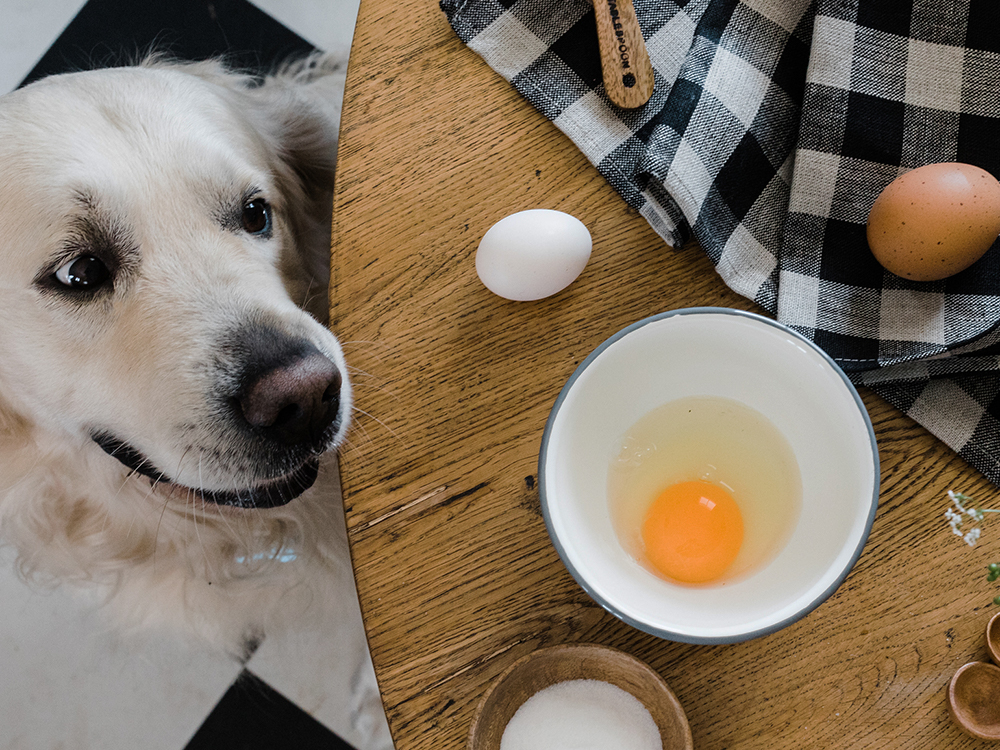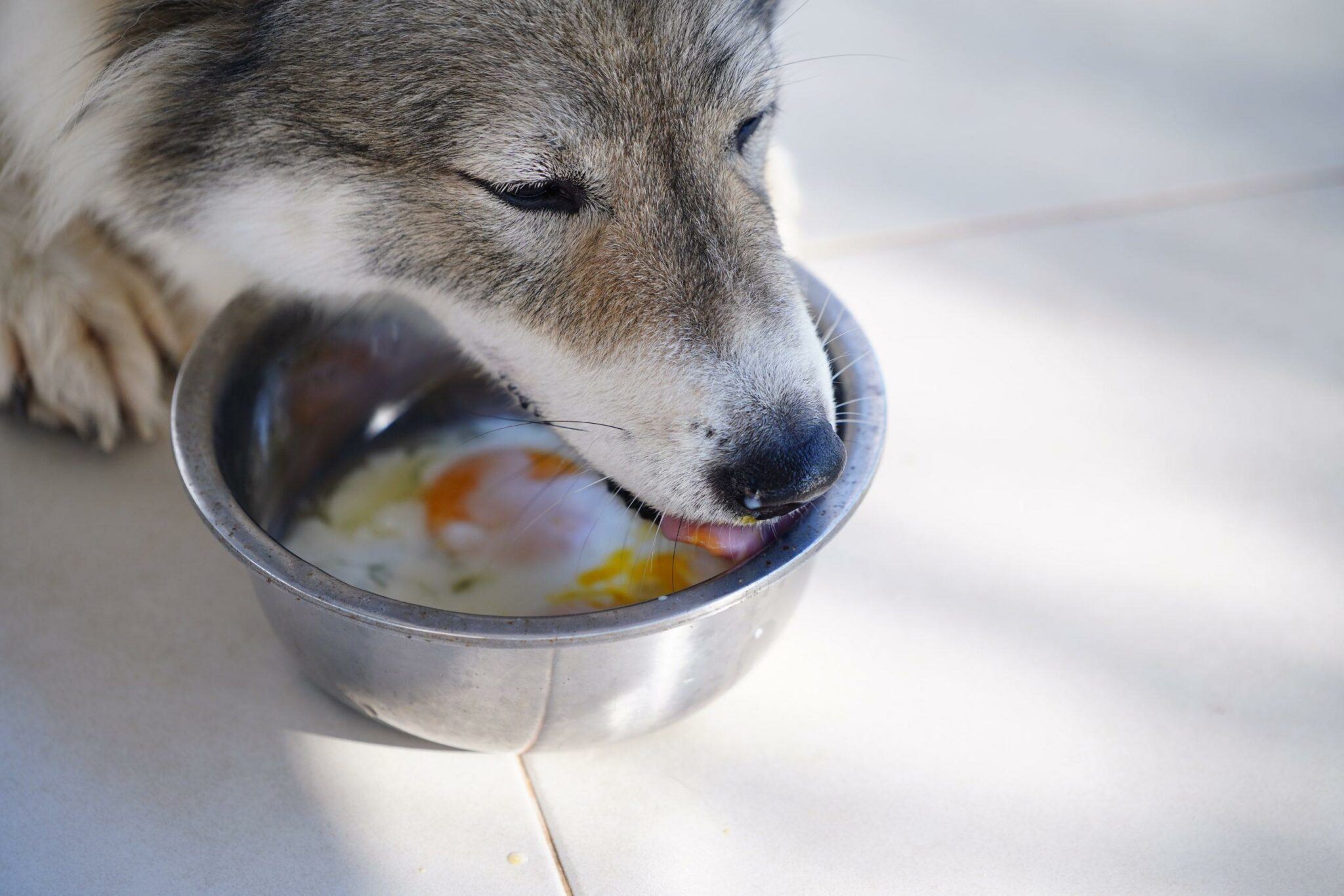As an Amazon Associate, I earn from qualifying purchases
You want the best for your furry friend, ensuring they get all the nutrients they need to thrive. But when it comes to unconventional food items like eggshells, you might find yourself wondering, “Can my dog eat eggshells?”
You’re not alone! Many dog owners are curious about the potential benefits and risks of adding eggshells to their pet’s diet. Imagine if there was a simple addition to your dog’s meal that could boost their calcium intake and support their overall health.
But is this crunchy supplement a safe choice? Your dog’s well-being is a top priority, and understanding the facts can help you make informed decisions. We’ll dive into the pros and cons of feeding eggshells to your dog, offering insights that might surprise you. Stick around, and you’ll discover whether this unusual treat is a hidden gem or something to avoid. Your pet’s health could benefit from what you learn next!

Nutritional Benefits Of Eggshells
Dogs can safely eat eggshells. These shells offer calcium, which strengthens bones and teeth. Always crush them into a fine powder to avoid choking hazards.
Eggshells might seem like waste, but they hold surprising value for dogs. They offer essential nutrients that can enhance a dog’s diet. Many dog owners overlook the benefits of eggshells. Including them can be a simple way to boost canine health.Rich Source Of Calcium
Eggshells are packed with calcium. This mineral is crucial for strong bones and teeth. Dogs need calcium for muscle function too. A lack of calcium can cause health issues. Adding eggshells can help meet this need.Trace Minerals For Health
Eggshells contain more than just calcium. They also have magnesium, phosphorus, and potassium. These trace minerals support a dog’s overall health. They aid in various body functions and promote well-being.Supports Joint Health
Eggshells have a unique benefit for joints. The membrane inside eggshells contains collagen. Collagen is important for joint health. It helps keep joints flexible and pain-free.Natural And Low-cost Supplement
Eggshells offer a budget-friendly supplement option. They are natural and easy to prepare. Simply clean, dry, and crush them into a fine powder. This powder can be sprinkled over dog food.Easy To Incorporate Into Diet
Including eggshells in a dog’s diet is simple. Just ensure they are finely crushed to avoid sharp edges. Start with small amounts. Monitor your dog’s response to this new addition.
Potential Risks Of Feeding Eggshells
Eggshells contain calcium, which benefits dogs. Yet, feeding them eggshells can pose risks. It’s essential to understand these before sharing this treat.
1. Choking Hazard
Eggshell pieces can be sharp. They might cause choking in dogs. Smaller dogs face a higher risk. Always ensure eggshells are finely ground.
2. Digestive Issues
Large eggshell pieces can upset a dog’s stomach. This may lead to vomiting or diarrhea. Dogs with sensitive stomachs are more vulnerable. Monitor your pet for any signs of discomfort.
3. Bacterial Contamination
Raw eggshells might carry bacteria like Salmonella. These can make dogs sick. Cooking the eggshells reduces this risk. Always wash eggs before using their shells.
4. Overconsumption Of Calcium
Too much calcium can harm dogs. It may cause kidney stones or other issues. Balance is key. Ensure your dog doesn’t consume excessive calcium.
5. Allergic Reactions
Some dogs might be allergic to eggs. This includes eggshells. Watch for signs of allergies. These can be itching or skin irritations.
Understanding these risks helps keep your dog safe. Always consult a vet when introducing new foods.
Preparing Eggshells For Dogs
Eggshells can be a safe and natural source of calcium for dogs. Wash, dry, and crush the shells into a fine powder before adding them to your dog’s food. This simple addition can support healthy bones and teeth, keeping your furry friend in great shape.
Eggshells are often overlooked as a beneficial addition to your dog’s diet. Preparing eggshells for dogs isn’t complicated, but it does require some attention to detail to ensure safety and effectiveness. As a dog owner, you might be surprised at how simple it is to boost your pet’s nutrition with something you usually throw away. Before you dive in, let’s discuss how to prepare eggshells properly for your furry friend.Cleaning Eggshells Thoroughly
Always start by cleaning the eggshells. This step is crucial to remove any bacteria or contaminants that might be present. Rinse the eggshells under warm water. You don’t need soap—just a good rinse to clean off any residue. Once rinsed, let them dry completely. You can pat them dry with a paper towel or leave them out to air dry. This ensures there’s no moisture that could lead to mold.Baking For Extra Safety
Baking eggshells is a simple step that adds an extra layer of safety. Preheat your oven to about 200 degrees Fahrenheit. Place the dry eggshells on a baking sheet. Bake them for around 10 minutes. This process kills any remaining bacteria and makes them easier to grind. Remember, you don’t want them to turn brown—just enough to dry and sanitize.Grinding Eggshells Into Powder
Once baked, it’s time to grind the eggshells into a fine powder. You can use a coffee grinder or a food processor. The goal is to get a consistent, fine texture. Avoid leaving large pieces as they might be difficult for your dog to digest. A fine powder is easy to mix with your dog’s food and ensures they can absorb the nutrients properly.Incorporating Eggshell Powder Into Dog Food
Start by adding small amounts of eggshell powder to your dog’s meals. A teaspoon is usually a good starting point. Monitor your dog’s reaction and adjust as necessary. Mix the powder thoroughly into the food. It’s best to start with wet food as it blends better. You can also sprinkle it over dry food, but make sure your dog is comfortable with the new addition.Monitoring Your Dog’s Health
Keep an eye on your dog’s health after introducing eggshells. Look for improvements in their coat, energy levels, and overall wellbeing. Eggshells are packed with calcium, which is beneficial for bone health. Have you noticed any changes? Share your experiences with other pet owners. It’s these small tweaks that can lead to a healthier, happier life for your dog. Eggshells are a simple, cost-effective way to enhance your dog’s diet. How will you prepare them for your pet?Portion Control And Frequency
Feeding your dog eggshells requires careful portion control and frequency management. This ensures your dog gets the right nutrients without any risk. Eggshells are rich in calcium, but too much can be harmful. Understanding how often and how much to feed is crucial for your dog’s health.
Understanding Portion Control
Start with small amounts of crushed eggshells. Mix them into your dog’s food. A quarter teaspoon per day is usually enough. This helps avoid calcium overload. Monitor your dog’s health and adjust portions as needed.
Frequency Matters
Offer eggshells two to three times a week. This frequency provides benefits without overwhelming your dog’s system. Regular intake promotes strong bones and teeth. Balance is key to maintaining optimal health.
Signs Of Overfeeding
Watch for signs of overfeeding eggshells. Digestive issues may arise. Look for constipation or stomach discomfort. Reduce the portion if these symptoms occur. Consult a vet for personalized advice.
Consultation Is Key
Speak with your veterinarian about feeding eggshells. They can offer guidance based on your dog’s needs. Each dog has unique dietary requirements. Professional advice ensures safe feeding practices.
Signs Of Adverse Reactions
Feeding dogs eggshells can offer nutritional benefits. Yet, not all dogs react well. Watching for adverse reactions is crucial. Dogs may show signs if eggshells don’t suit them. Recognizing these signs helps ensure your pet’s safety. Early detection can prevent serious health issues. Let’s explore common signs of adverse reactions.
1. Vomiting Or Diarrhea
Vomiting and diarrhea are common signs of digestive issues. These symptoms may appear after consuming eggshells. If your dog vomits or has loose stools, stop feeding eggshells. Seek advice from a vet to ensure your dog’s health.
2. Change In Appetite
A sudden change in appetite can indicate discomfort. Your dog may refuse to eat or seem less interested in food. This change could be linked to consuming eggshells. Monitor your dog’s eating habits closely.
3. Lethargy And Fatigue
Lethargy and fatigue may suggest an adverse reaction. If your dog seems unusually tired, take notice. They might sleep more or show less interest in activities. Energy levels dropping can be a red flag.
4. Abdominal Pain Or Discomfort
Watch for signs of abdominal pain in your dog. This could include whining, restlessness, or guarding the stomach area. These behaviors indicate discomfort and require attention.
5. Allergic Reactions
Allergic reactions might occur, causing itching, redness, or swelling. Check your dog for signs of skin irritation. Allergies can develop quickly and may need medical intervention.
6. Difficulty Breathing
Breathing difficulties are serious signs of an adverse reaction. Look for heavy panting or wheezing. Immediate veterinary care is essential if breathing problems occur.
Ensuring your dog’s well-being involves monitoring their reactions. Observing these signs helps maintain their health. Always consult with a vet if unsure about your dog’s diet.

Frequently Asked Questions
Are Eggshells Safe For Dogs To Eat?
Yes, eggshells are generally safe for dogs. They are rich in calcium, which supports bone health. However, make sure they are crushed into powder to prevent choking. Always ensure eggshells are clean and free from chemicals or sharp edges before serving them to your dog.
How Should I Prepare Eggshells For Dogs?
Crush eggshells into a fine powder before adding them to your dog’s food. This helps prevent choking and ensures they can digest them easily. Clean the shells thoroughly to remove any contaminants. Baking the shells can help kill bacteria, making them safe for your pet.
Can Eggshells Cause Allergies In Dogs?
Eggshells are unlikely to cause allergies in dogs. However, some dogs may have sensitivities or allergies to eggs themselves. If your dog shows signs of allergies, consult your vet before introducing eggshells into their diet. Always monitor your dog for any adverse reactions.
What Are The Benefits Of Eggshells For Dogs?
Eggshells provide calcium, which is essential for your dog’s bone health. They can also aid in dental health by providing minerals. Calcium helps in muscle and nerve function as well. Eggshells are a natural supplement, enhancing your dog’s overall well-being.
Conclusion
Feeding dogs eggshells can be beneficial in moderation. They provide calcium, which is important for bones. But ensure the shells are clean and crushed. Some dogs might have trouble digesting them. Watch for any signs of discomfort or allergies. Consult your vet before making changes to your dog’s diet.
Every dog is unique, and what works for one might not work for another. Keep your dog’s health a top priority. Always prioritize balanced nutrition. Your furry friend deserves the best care. Keep them happy and healthy with informed choices.
As an Amazon Associate, I earn from qualifying purchases

